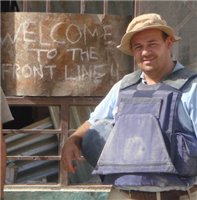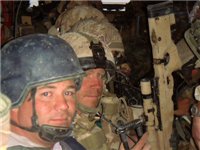Olwyn Hocking reports on a very thought-provoking lecture by Alastair Leithead.
[Note that this wasn't an RTS event, but is reported here because of its relevance to the North East and television]
 He got into broadcasting by juggling at a job interview with Radio Newcastle.
He got into broadcasting by juggling at a job interview with Radio Newcastle.
Now in February 2009 he's becoming the BBC's South East Asia Correspondent, based in Bangkok.
Alastair Leithead returned to his Newcastle school to deliver the Peter Taylor Lecture, and trace the career which has taken him from his local newspaper and TV newsrooms to become an award-winning foreign correspondent.
He's become well-known as the BBC's Kabul Correspondent for the last three years, and shared with the audience the importance of having his own sources of information to ensure that army 'embedding' did not reduce his editorial independence. One report on the inadequacies of army vehicles was raised in Prime Minister's Questions — "the Brigadier was very upset."
His path to his chosen career goal did not come easy. After working with TV and Radio in the BBC's regional newsroom, he moved to News 24 in London but become restive. His only way out was to resign from his staff post and take the risk of becoming a freelance reporter, based in South Africa.
"If you want to do it enough, you'll do it," he said. "I worked hard, and then I had a bit of luck." His big break came when he seized his opportunity to make his mark. He arrived in New Orleans just before Katrina and did all the initial reports when the hurricane struck.
His experiences in Kabul have provided severe tests of the need of journalists and soldiers to avoid becoming entangled with the story. One heart-rending example was the young girl who came to the compound gate and asked for help. She was about to be married to a much older man. She was taken in and angry family members demanded her return. The army negotiated that she be allowed to go to an uncle far away — but soon after, the suitor arrived, making clear he would now pursue her and kill both the girl and the uncle.
The dangers of becoming involved were also illustrated by the story of the photographer who took a memorable picture of a small child on its knees in Sudan — with a vulture watching close by. This had such an impact that was used on front pages around the world, awakening readers to events in the Sudan. Aid agencies used it on posters. It won a Pulitzer prize. But then questions poured in — what happened to the child afterwards? Did the photographer assist the child? He committed suicide three months after winning photography's greatest accolade.
One of Alastair's earliest experiences was in Madagascar when he witnessed an attack in a crowd during the General Strike. He felt the need to step in to protect the victim but held back — another person who did so was beaten to death.
In Afghanistan he was very aware of the risks faced by those who worked with him. His local camera operator had been killed, and he was conscious of the risks now taken by his new camera operator.
 Audience questions following the Lecture included a challenge as to whether reports from Afghanistan had adequately reflected the difficulties within the armed forces, including shortages of supplies. He felt that the public had become more aware of the real situation and that the public mood had changed — support in the UK for the armed forces and for Remembrance Day seemed to have increased.
Audience questions following the Lecture included a challenge as to whether reports from Afghanistan had adequately reflected the difficulties within the armed forces, including shortages of supplies. He felt that the public had become more aware of the real situation and that the public mood had changed — support in the UK for the armed forces and for Remembrance Day seemed to have increased.
Photo courtesy BBC Panorama – THREE BLOODY SUMMERS
Irritation was expressed by one questioner into the constant use of two-way interviews. Alastair agreed that the reports on the ground were vital — but defended two-ways as a means for correspondents to add context within rolling news.
Alastair's multimedia role has resulted in Awards in both TV and Radio — and his final appearances from Afghanistan included a Panorama documentary. His preferred medium is radio — "It's hot-wired straight to your brain – it has a stronger impact."
He summarised his role in Kabul by quoting Martha Gelhorn: "You're not a War Correspondent – you're reporting on ordinary people in terrible situations."

